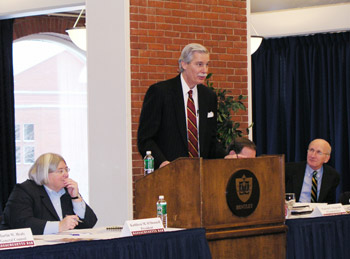 |
| Chief Justice for Administration and Management Robert A. Mulligan filled in the House of Delegates about the progress of changes in the court system. Also pictured are MBA President Kathleen M. O'Donnell and MBA Vice President Edward McIntyre. |
A new MBA committee has been authorized by the House of Delegates to study all aspects of the health and safety questions at the Middlesex County Edward J. Sullivan Courthouse in Cambridge.
At its Jan. 19 meeting, the HOD was asked to approve a resolution that would add the MBA as a plaintiff in possible legal action seeking redress for unhealthy and unsafe work conditions at the building. Civil Litigation Section Chair Chris Milne, who is representing court workers and the Massachusetts Academy of Trial Attorneys (MATA) on a pro bono basis in the matter, made the proposal. According to Milne, legal action would include any injunctive relief or discovery against Chief Justice for Administration and Management Robert A. Mulligan and David B. Perini, commissioner of the state Division of Capital Asset Management (DCAM).
After hearing sharply divided views from representatives on all sides of the issue - including Milne, Mulligan, Middlesex District Attorney Martha Coakley and Atty. Richard Zelinsky of Goulston & Storrs, who represents the state's Division of Capital Asset Management, which oversees the building - the HOD voted to postpone any discussion on whether to join in a lawsuit until an independent MBA committee could study all aspects of the issue and report back at the next HOD meeting, on March 3.
During an interview prior to the HOD meeting, Milne cited a litany of problems with the courthouse, chiefly asbestos in the building, improperly working elevators and extreme fluctuating temperatures that range from 50 degrees to 90 degrees in different parts of the building.
In addition to the backing of MATA, Milne said he also has received support to pursue litigation from others, including Clerk of the Superior Court Edward J. Sullivan and Clerk of the District Court Robert Moscow. Additionally, 15 judges who sit at the courthouse have written Mulligan asking for an immediate contingency plan.
"We want, in an urgent basis in a matter of months, for the court facility to be relocated to another location for the necessary replacement of elevators to be done, the necessary repair of the h/vac system to be done, the abatement of the asbestos of the entire building when it is not occupied and other necessary repairs," Milne said. "Then we would have the people return to the building.
"We have a building that is 35 years old and when a building is 35 years old and particularly when it is sprayed throughout with asbestos fireproofing, common sense says you get people out of the building; you don't do it when they are in the building."
Consultants Milne hired to evaluate the potential health hazard posed by the renovation project at the courthouse, Dr. L. Christine Oliver and Paul Heffernan, concluded that any asbestos in the building should be removed urgently and no building occupants should remain in the building while that is occurring.
But Mulligan has stated that tests have shown that air quality in the courthouse is "safe for the occupants and users." He said the Administrative Office of the Trial Court sought help from the DCAM and the Department of Public Health to monitor air quality and to address concerns. More than 300 samples were taken to detect asbestos. Additionally, the Trial Court sought assistance from the National Institute of Occupational Safety and Health (NIOSH) to review the results of the testing samples and to provide an independent assessment.
"A letter from NIOSH … (Jan. 11) …, which has been provided to the building occupants, confirms that the asbestos containing materials in the building do not pose a health risk to occupants," said Mulligan in the statement. "… Additionally, DCAM Commissioner David Perini has agreed to suspend temporarily the elevator repair work and any interior work, including the cooling tower replacement project. I and my staff will continue to meet and discuss any air quality concerns of Trial Court judges and employees and others who occupy the courthouse."
At the HOD meeting, Mulligan stated emphatically, "My primary concern as CJAM is the health and safety of the people who work for the Trial Court."
He also blasted the request for the MBA to join in a potential lawsuit, saying, "there is no urgency to the proposed litigation… If this organization lends its prestige to a lawsuit that I think is premature, that will be taken as a sign that a group of 50 or 60 lawyers had reviewed and sifted through all the information and concluded that there is a present situation that is a health concern to the occupants. In no way is this an urgent proposition."
In December, Milne complained about the elevators, which had last passed inspection in January 2001. That prompted the state to issue a 90-day temporary permit to use the elevators. Having received reports that employees have been injured on the elevators, Milne asked court administrators to give him specific details on those alleged incidents. Court administrators responded by telling him the only way he can get the information is through civil discovery.
"I hear there are a great number of incidents of not only people being injured but sitting judges being trapped in elevators for hours," Milne said. "The documentation of that I can only get through getting subpoena power."
DCAM Spokesman Kevin Flanigan said the elevators do need to be renovated, but that project has been put on hold until DCAM and court officials have more opportunity to talk with building occupants. He declined to discuss the elevator issue further.